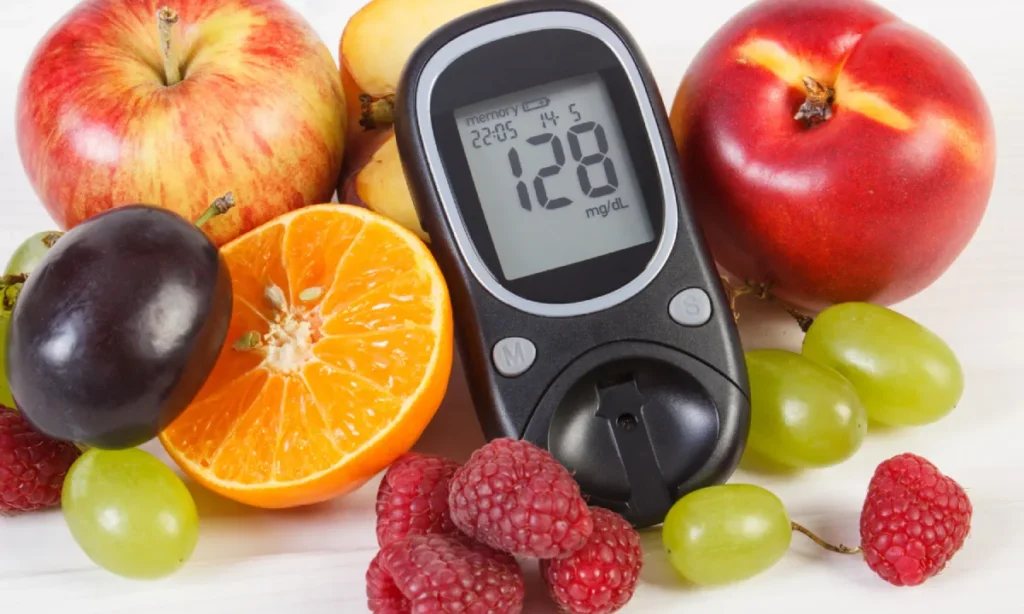Got diabetes? Think you can’t enjoy fruits anymore? Well, that’s a common myth that fruits are a no-go because of their sugar. But actually, you can still enjoy fruits and keep your blood sugar in target range. In this easy-to-read blog, we’re going to show you the list of the top 10 fruits that are just right for people with diabetes. These fruits are low in sugar and won’t mess with your blood sugar levels. So, get ready to add some tasty and healthy choices back into your diet.
Contents
Top 10 Fruits For A Diabetes-Friendly Diet
Berries
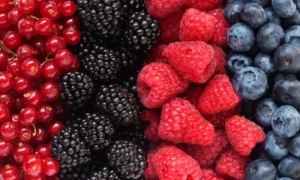 Berries, such as strawberries, blackberries, and raspberries, are fantastic additions to a diabetes-friendly diet.
Berries, such as strawberries, blackberries, and raspberries, are fantastic additions to a diabetes-friendly diet.
Nutritional Content
Berries are a powerhouse of nutrition, particularly rich in Vitamin C and fiber. To give you an example, one cup of fresh blueberries provides 84 calories and 21 grams of carbohydrates, which is quite manageable in a balanced diet.
Benefits for Diabetics
Thanks to their low glycemic index (GI) and high fiber content, berries are an excellent choice for people with diabetes. The GI of blueberries is around 25, with a glycemic load of 2.02, indicating they have a minimal impact on blood sugar levels. The antioxidants and fiber in berries support overall health and can help manage blood sugar spikes.
Best Way for Consuming Berries in the Diet
Incorporating berries into your diet is both easy and versatile. Enjoy them fresh as a snack, blend them into smoothies, toss them into salads, or mix them into yogurt or oatmeal for a nutritious boost. These methods ensure you get all the goodness of berries without adding unnecessary sugars to your diet.
Avocado
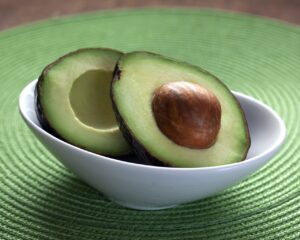 Avocado is a unique and nutritious fruit that’s a perfect fit for a diabetes-friendly diet. Unlike most fruits, avocados are low in sugar and high in healthy fats, making them an excellent choice for managing blood sugar levels.
Avocado is a unique and nutritious fruit that’s a perfect fit for a diabetes-friendly diet. Unlike most fruits, avocados are low in sugar and high in healthy fats, making them an excellent choice for managing blood sugar levels.
Nutritional Content: An average avocado contains about 8.5 grams of carbohydrates and 7 grams of fiber, enriching your diet with essential nutrients. Avocados are also a great source of potassium and are packed with healthy unsaturated fats that are good for your heart.
Benefits for Diabetics:
- Low glycemic index (GI) of about 40, combined with its high fiber content
- These features help improve insulin sensitivity and manage blood sugar levels effectively.
- The healthy fats in avocados can also aid in maintaining a balanced diet, contributing to overall health and well-being.
Best Way to Include Avocados in Your Diet
- You can spread avocado on whole-grain toast for a healthy breakfast, add slices to a salad or sandwich for extra creaminess, or blend it into smoothies for a nutrient-rich treat. Their creamy texture and mild flavor make them a great addition to both sweet and savory dishes.
Apples
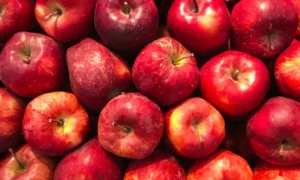 Apples are a staple fruit that not only burst with flavor but are also packed with health benefits, making them an excellent choice for those managing diabetes. Their crunchy texture and juicy taste come with a low glycemic index (GI) and a wealth of fiber, which are beneficial for maintaining stable blood sugar levels.
Apples are a staple fruit that not only burst with flavor but are also packed with health benefits, making them an excellent choice for those managing diabetes. Their crunchy texture and juicy taste come with a low glycemic index (GI) and a wealth of fiber, which are beneficial for maintaining stable blood sugar levels.
Nutritional Content: Apples have a low GI of 36 and a Glycemic Load of 6, highlighting their low sugar content. This characteristic makes apples an ideal snack or addition to meals for individuals looking to manage their blood sugar effectively.
Their nutritional profile supports blood sugar management and contributes to a balanced diet, making them a smart choice for anyone with diabetes.
Best Way to Include Apples in Your Diet
- Enjoy them fresh as a convenient and portable snack, chop them into oatmeal or cereal for added texture and sweetness, or mix them into salads for a crunchy element.
- When consuming apples, it’s beneficial to eat them with their skin on, as the skin contains a significant amount of fiber. However, it’s important to wash them thoroughly before eating.
- For a balanced snack, pair an apple with a source of healthy fat or protein, such as almond butter or a handful of nuts, to further stabilize blood sugar levels.
Oranges
 Oranges, with their bright color and refreshing taste, are not just a delight to the senses but also a boon for blood sugar management.
Oranges, with their bright color and refreshing taste, are not just a delight to the senses but also a boon for blood sugar management.
Nutritional Content: The GI of an orange ranges between 31 and 51, and it has a Glycemic Load of around 5. These figures reflect oranges’ ability to provide energy without causing rapid spikes in blood sugar levels, making them a healthy option for those monitoring their glucose intake.
Benefits for Diabetics
- Oranges are a powerhouse of nutrients, offering a significant boost of vitamin C, which is essential for immune function and skin health.
- The fiber content in oranges helps promote feelings of fullness, reducing the likelihood of overeating and assisting in maintaining stable blood sugar levels.
- Additionally, the fiber aids in digestion and supports heart health by lowering cholesterol levels.
Best Way to Include Oranges in Your Diet: Oranges are incredibly versatile and can be incorporated into diabetic meal plans in various creative ways.
- Enjoy them fresh as a juicy snack, add orange segments to salads for a burst of citrus flavor, or use freshly squeezed orange juice to brighten up marinades and dressings.
- You can also blend oranges into smoothies for a vitamin-packed drink or use their zest to add depth to baked goods and desserts.
- Remember, consuming whole oranges rather than just the juice provides the maximum benefit of fiber, so aim to include the whole fruit in your diet whenever possible.
Guava
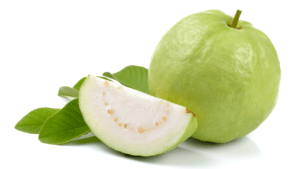 Guava is a powerhouse fruit that’s not only delicious but also incredibly beneficial for people managing diabetes. Its low glycemic index (GI) of 12-24 makes it a fantastic choice for keeping blood sugar levels stable. Plus, guava is packed with nutrients that support overall health.
Guava is a powerhouse fruit that’s not only delicious but also incredibly beneficial for people managing diabetes. Its low glycemic index (GI) of 12-24 makes it a fantastic choice for keeping blood sugar levels stable. Plus, guava is packed with nutrients that support overall health.
Nutritional Value of Guava: Guavas are rich in essential nutrients. They provide calcium, manganese, and potassium, which are important for bone health and blood pressure regulation. They’re also full of lycopene, an antioxidant that’s great for heart health, and vitamins A and C, which boost your immune system and keep your skin healthy.
Ways to Eat Guava for People with Diabetes:
- Fresh Out of Hand: Simply slice and eat guava like an apple. The skin is edible, too, and packed with nutrients.
- In Salads: Chop guava into small pieces and add it to your favorite salad for a tropical twist.
- Smoothies: Blend guava with other low-GI fruits and some unsweetened yogurt for a refreshing and healthy smoothie.
- Guava Tea: Boil guava leaves in water to make a soothing tea. This has been traditionally used to help lower blood sugar levels.
- Guava Jam: Make a diabetic-friendly guava jam by using a sugar substitute. Enjoy it with whole grain bread for a fiber-rich snack.
Remember, while guava is beneficial for diabetes management, it’s important to consume it as part of a balanced diet. Keep an eye on portions to ensure you’re aligning with your overall dietary goals.
Kiwi
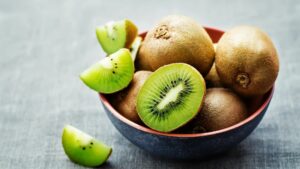 Kiwi, a small fruit with a vibrant green hue and a tropical taste, is not just a feast for the eyes but also a powerhouse of nutrition. Rich in vitamin C, fiber, and potassium, kiwis are a fantastic choice for anyone, but especially for those managing diabetes.
Kiwi, a small fruit with a vibrant green hue and a tropical taste, is not just a feast for the eyes but also a powerhouse of nutrition. Rich in vitamin C, fiber, and potassium, kiwis are a fantastic choice for anyone, but especially for those managing diabetes.
Nutritional Content: With a GI of 50, kiwis strike a perfect balance between sweetness and healthfulness. This makes them a smart addition to a diabetic-friendly diet, providing essential nutrients without significantly impacting blood sugar levels.
Benefits for Diabetics
- The high vitamin C content in kiwi boosts immune system function and skin health
- Its fiber content promotes digestive health and helps maintain steady blood sugar levels by slowing the absorption of sugar into the bloodstream.
- Potassium, another key nutrient in kiwis, supports heart health by regulating blood pressure.
Best Way to Include Kiwi in Your Diet:
- Kiwi can be enjoyed in a variety of ways, making it easy to incorporate into your daily meals and snacks.
- Slice kiwi into fruit salads or yogurt for a refreshing breakfast or snack.
- You can also blend it into smoothies for a nutrient-rich drink or use it as a tangy topping for oatmeal or pancakes.
- For a unique twist, add kiwi to savory salads for a burst of flavor.
Considering the best time to consume kiwi, having it right before bedtime may contribute to sound sleep, thanks to its high serotonin content, which is known to aid in sleep regulation.
Peaches
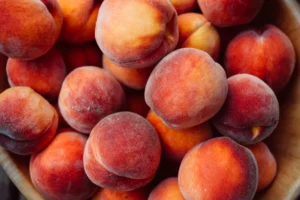 Peaches, with their soft skin and sweet, juicy flesh, are not just a summer favorite but also a nutritious choice for those managing diabetes.
Peaches, with their soft skin and sweet, juicy flesh, are not just a summer favorite but also a nutritious choice for those managing diabetes.
Nutritional Benefits: Peaches have a low GI of 28, making them a safe option for individuals with diabetes looking to maintain steady blood sugar levels. This low GI, combined with their fiber content, helps slow the absorption of sugar into the bloodstream, preventing spikes in blood sugar levels and supporting overall blood sugar management.
Benefits for Diabetics
- The fiber in peaches not only aids in blood sugar control but also contributes to digestive health, ensuring smooth bowel movements and a healthy digestive system.
- Additionally, peaches are rich in vitamins and minerals, including vitamin C, vitamin A, and potassium, which support immune function, eye health, and heart health.
Best Way to Include Peaches in Your Diet: Enjoying peaches in moderation is key to incorporating them into a diabetes-friendly diet. Fresh peaches can be sliced and added to salads for a burst of sweetness, blended into smoothies for a refreshing drink, or grilled for a warm, caramelized dessert. You can also chop them into salsas for a sweet and savory dip or topping for grilled meats.
Pears
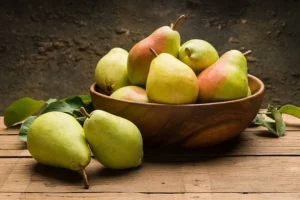 Pears, with their juicy flesh and sweet, subtle flavor, serve as a delightful treat that fits beautifully into a diabetes management plan.
Pears, with their juicy flesh and sweet, subtle flavor, serve as a delightful treat that fits beautifully into a diabetes management plan.
Nutritional Benefits: Pears are packed with a variety of nutrients that contribute to overall health. They contain essential minerals such as calcium, iron, potassium, and magnesium, and are rich in vitamins C, E, and K. With a GI of 38–50, pears are a low-GI fruit, which means they have a minimal impact on blood sugar levels when consumed in moderation.
Benefits for Diabetics
- The high fiber content in pears promotes healthy digestion and helps maintain steady blood sugar levels by slowing the absorption of glucose.
- Prevent sudden spikes in blood sugar, making pears an excellent choice for blood sugar control.
- Additionally, the vitamins and minerals in pears support immune health, bone health, and provide antioxidant protection.
Creative Ways to Include Pears in Your Diet
- Pear and Walnut Salad: Combine sliced pears with mixed greens, walnuts, and a sprinkle of blue cheese for a nutritious salad.
- Baked Pears: Halve pears and remove the core, sprinkle with cinnamon, and bake until tender. Serve with a dollop of Greek yogurt for a healthy dessert.
- Pear Smoothie: Blend ripe pears with Greek yogurt, a handful of spinach, and some flaxseeds for a fiber-rich, refreshing drink.
- Pear and Chicken Sandwich: Add thinly sliced pear to your chicken sandwich for a hint of sweetness and extra crunch.
- Pear Salsa: Dice pears and mix with lime juice, chopped cilantro, and diced red onions for a fresh salsa, perfect as a topping for grilled fish or chicken.
Remember, as with any fruit, it’s important to consume pears in moderation and be mindful of portion sizes to maintain optimal blood sugar levels.
Cherries
 Cherries, with their deep red hue and juicy burst of sweetness, are not just a delight to the palate but also a boon for those managing diabetes.
Cherries, with their deep red hue and juicy burst of sweetness, are not just a delight to the palate but also a boon for those managing diabetes.
Nutritional Benefits: A serving of cherries contains approximately 16 grams of carbohydrates, 1.06 grams of protein, 2.1 grams of fiber, and 8 grams of sugar. This nutritional composition, combined with a low GI of 20, highlights cherries as an excellent choice for diabetics. They are also rich in vitamins A, C, and K, and loaded with potassium and antioxidants, supporting overall health and well-being.
Benefits for Diabetics
- The low GI of cherries means they have a minimal impact on blood sugar levels.
- Their high antioxidant content helps fight inflammation, a common concern for individuals with chronic conditions like diabetes.
- Additionally, the fiber in cherries aids in digestion and helps provide a sense of fullness, which can assist with weight management and blood sugar control.
Serving Suggestions and Portion Control Tips:
- Fresh Cherries: Enjoy a small bowl of fresh cherries as a snack. Measure out a portion rather than eating directly from the bag to keep track of your intake.
- Cherry Smoothies: Blend a handful of cherries with unsweetened almond milk and a scoop of protein powder for a balanced, diabetic-friendly smoothie.
- Cherry Toppings: Add chopped cherries to salads or yogurt for a burst of flavor and color. This also helps spread out the fruit’s sugars over a larger meal.
- Frozen Cherries: Freeze cherries for a cool treat. Eating them frozen can slow down consumption, helping with portion control.
Papaya
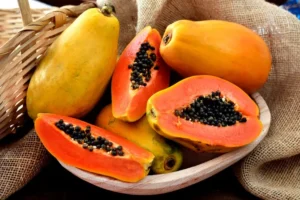 Wondering if papaya is okay to eat when you have diabetes? The answer is a big yes! Papaya is a sweet and tropical fruit that’s really good for you, especially if you’re keeping an eye on your blood sugar.
Wondering if papaya is okay to eat when you have diabetes? The answer is a big yes! Papaya is a sweet and tropical fruit that’s really good for you, especially if you’re keeping an eye on your blood sugar.
Papaya is packed with good stuff like fiber, vitamin C, A, and E. It’s also full of antioxidants which help keep your body healthy. Because it has a low glycemic index, eating papaya won’t make your blood sugar spike.
Why Papaya is Great for Diabetics:
- Fiber: Helps control your blood sugar.
- Vitamins and Antioxidants: Keep your immune system strong and your skin glowing.
- Low Glycemic Index: Means it’s a sweet fruit that doesn’t mess with your blood sugar much.
Eating Papaya the Right Way:
- Snack Time: Cut it up and eat it just like that.
- Smoothies: Blend it with some other low-sugar fruits or veggies for a cool drink.
- Salad: Chop it into small pieces and mix it into your greens for a tropical salad.
- Dessert: Mash it up, freeze it, and you’ve got a simple, sweet treat.
Just remember, even though papaya is good for diabetes, it’s still important to watch how much you eat. Keeping an eye on portions makes sure you’re getting just the right amount without overdoing the sugar. Enjoying a bit of papaya can be a tasty part of your diabetes-friendly diet.
A Word From MantraCare
If you are facing diabetes-related issues, MantraCare is here to help. Book your free trial online diabetes consultation session now to connect with a specialist diabetologist.
